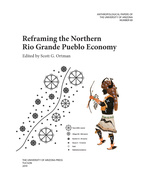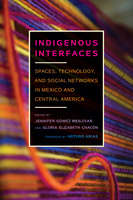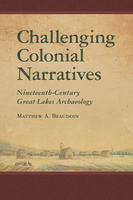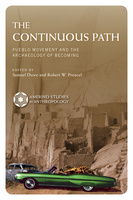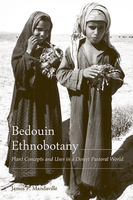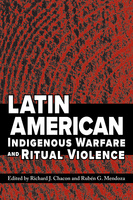The University of Arizona Press is the premier publisher of academic, regional, and literary works in the state of Arizona. They disseminate ideas and knowledge of lasting value that enrich understanding, inspire curiosity, and enlighten readers. They advance the University of Arizona’s mission by connecting scholarship and creative expression to readers worldwide.
Showing 321-330 of 1,704 items.
Reframing the Northern Rio Grande Pueblo Economy
Edited by Scott Ortman
The University of Arizona Press
The archaeological record of the Northern Rio Grande exhibits the hallmarks of economic development, but Pueblo economies were organized in radically different ways than modern industrialized and capitalist economies. Contributors to Reframing the Northern Rio Grande Pueblo Economy explore the patterns and determinants of economic development in pre-Hispanic Rio Grande Pueblo society, building a platform for more broadly informed research on this critical process.
Indigenous Interfaces
Spaces, Technology, and Social Networks in Mexico and Central America
Edited by Jennifer Gómez Menjívar and Gloria Elizabeth Chacón
The University of Arizona Press
Indigenous Interfaces rejects the myth that Indigeneity and information technology are incompatible through its compelling analysis of the relationships between Indigenous peoples and new media. The volume illustrates how Indigenous peoples are selectively and strategically choosing to interface with cybertechnology, highlights Indigenous interpretations of new media, and brings to center Indigenous communities who are resetting modes of communication and redirecting the flow of information. It convincingly argues that interfacing with traditional technologies simultaneously with new media gives Indigenous peoples an edge on the claim to autonomous and sovereign ways of being Indigenous in the twenty-first century.
The Davis Ranch Site
A Kayenta Immigrant Enclave in Southeastern Arizona
By Rex E. Gerald; Edited by Patrick D. Lyons
The University of Arizona Press
In this volume, the results of Rex Gerald’s 1957 excavations at the Davis Ranch site in southeastern Arizona's San Pedro River Valley are reported in their entirety for the first time. Annotations to Gerald’s original manuscript and newly written material place Gerald’s work in the context of what is currently known regarding the late thirteenth-century Kayenta diaspora and the relationship between Kayenta immigrants and the Salado phenomenon.
Challenging Colonial Narratives
Nineteenth-Century Great Lakes Archaeology
The University of Arizona Press
Challenging Colonial Narratives pushes postcolonial thinking in archaeology in socially and politically meaningful directions. Matthew A. Beaudoin calls for more nuanced interpretive frameworks and encourages archaeologists and scholars to focus on the different or similar aspects among sites to explore the nineteenth-century life of contemporaneous Indigenous and settler peoples.
The Continuous Path
Pueblo Movement and the Archaeology of Becoming
Edited by Samuel Duwe and Robert W. Preucel
The University of Arizona Press
The Continuous Path challenges archaeologists to take Pueblo concepts of movement seriously by privileging Pueblo concepts of being and becoming in the interpretation of anthropological data. The collaborative volume brings together Native community members, archaeologists, and anthropologists to weave multiple perspectives together to write the histories of Pueblo peoples past, present, and future.
Community-Based Participatory Research
Testimonios from Chicana/o Studies
Edited by Natalia Deeb-Sossa; Foreword by Louie F. Rodriguez
The University of Arizona Press
The first of its kind, Community-Based Participatory Research: Testimonios from Chicana/o Studies is a trailblazing collection of personal testimonies that showcase how understandings of community empowerment are incomplete as they have dismissed the variety of ways communities themselves have created social change strategies. In first-person accounts, Chicana/o researchers share their experience doing community-based participatory research (CBPR) praxis to illustrate its complexity and how it might be implemented to create sustainable change and community empowerment.
Bedouin Ethnobotany
Plant Concepts and Uses in a Desert Pastoral World
The University of Arizona Press
Transcontinental Dialogues
Activist Alliances with Indigenous Peoples of Canada, Mexico, and Australia
The University of Arizona Press
Transcontinental Dialogues presents innovative discussion, argument, and insight into the interactions between anthropologists and social researchers—both Indigenous and allies—as they negotiate together the terrain of the imposition of ongoing colonialism over Indigenous lives across three countries. The essays explore how scholars can recalibrate their moral, political, and intellectual actions to meet the obligations flowing from the decolonial alliances.
The Northeast
A Fire Survey
The University of Arizona Press
In this new book in the To the Last Smoke series, renowned fire expert Stephen J. Pyne narrates this history and explains how fire is returning to a place not usually thought of in America’s fire scene. He examines what changes in climate and land use mean for wildfire, what fire ecology means for cultural landscapes, and what experiments are underway to reintroduce fire to habitats that need it. The region’s great fires have gone; its influence on the national scene has not. The Northeast: A Fire Survey samples the historic and contemporary significance of the region and explains how it fits into a national cartography and narrative of fire.
Latin American Indigenous Warfare and Ritual Violence
Edited by Richard J. Chacon and Rubén G. Mendoza
The University of Arizona Press
Stay Informed
Subscribe nowRecent News


